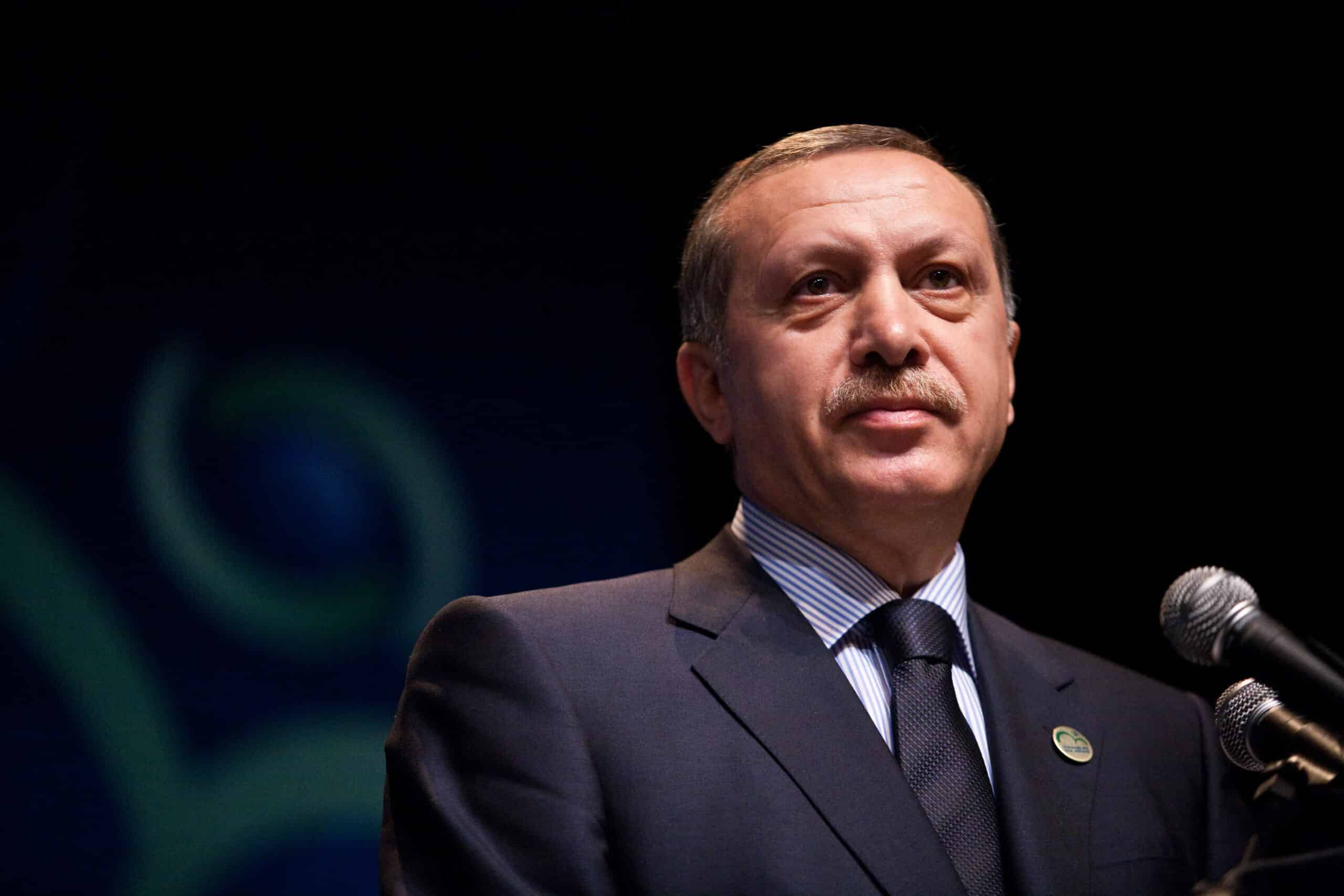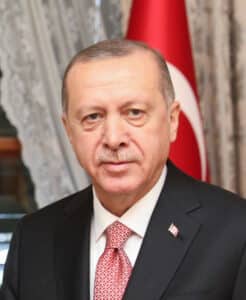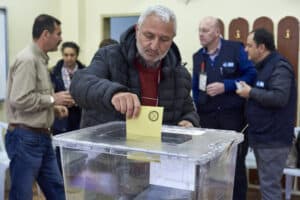Tayyip Erdogan 2010
Voters in Türkiye will head to the polls in a high-stake election on 14 May. Polls predict a record voter turnout, and a tight race between Erdogan and his main opposition candidate Kemal Kilicdaroglu, the leader of the Republican People’s Party (CHP) and presidential nominee for the six-party Nation Alliance bloc. Erdogan is facing his thoughest political challenge yet, since the opposition is organised and wanting to end his two decades in power. Analysts say Erdogan is closer than ever to defeat despite his heavy hand on the media, courts and the government’s record fiscal spending on social aid ahead of the vote. This election will be vital for the future of this country’s economy and foreign policy.
Who are the presidential candidates?
Erdogan, the longest serving leader ever in Türkiye, is running for the People’s Alliance, but has the toughest challenge to stay in power yet. Erdogan’s support has slipped in the last years because of numerous currency crashes as a result of his policy to cut interest rates during spiraling inflation, crashing the Turkish economy. The devastating earthquake in Southern Türkiye in the beginning of this year showed that policies on building standards were insufficient. More than 160,000 buildings collapsed, killing more than 50,000 people. Research from the New York Times showed that some buildings collapsed because of poor architectural decisions, risky design choices and the system of safety checks was flawed. Erdogan’s main challenger is Kemal Kilicdaroglu, who has led the centre-left Republican People’s Party for more than a decade. He gained significant popularity by raising corruption allegations against prominent figures in Erdogan’s AKP. His main pledge is to reverse Erdogan’s policies. Centrist Homeland Party leader Muharrem Ince was a contestor for the presidency, but on 11 May, he suddenly withdraws from the presidential race. His withdrawal could increase Kilicdaroglu’s chances of winning against Erdogan because the majority of his votes originated from the opposition’s voter base, as Ince was the CHP’s candidate in 2018 elections. His name will be on the voting ballets, as they are already printed. Sinan Ogan, is the smallest contestor, representing the right-wing Ancestral Alliance. He has been accused of having xenophobic and far-right policies.
What are the polls telling?
In the latest polls of Europe Elects, Kilicdaroglu has the most votes with 48.6% and Erdogan on 42.5%. The poll was carried out before Ince’s withdrawal. In the poll Ogan received 5.2% and Ince 3.7%. A candidate has to receive more than 50% of the votes in the first round to get elected. If no one gets a majority vote, the election goes into a second round between the two candidates who received the highest number of votes in the first round. In the second round, polls predict Kilicdarogly winning with 53,9%. In the polls, the National Alliance is expected to be the biggest coalition, even though it is expected that Erdogan’s AK Party will remain the biggest single party.
What are the political alliances?
There are three electoral alliances who are playing a decisive role in the parliamentary elections. Erdogan’s People’s Alliance constitutes of his Justice and Development Party (AK Party), ultra-nationalist parties Nationalist Movement Party (MHP), the Great Union Party (BBP), and recently joined by the New Welfare Party and the radical Islamist Free Cause Party, giving the coalition an authoritarian right profile. The biggest opposition alliance, the National Alliance, consists of six parties with very different political backgrounds, but were able to unite in their joint goal of removing Erdogan from his Presidential power. They are promising change after more than 20 years of AK party rule. The third alliance, Labour and Freedom Alliance, is led by the third largest party in Türkiye, the pro-Kurdish People’s Democratic Party (HDP). Their members will race in the parliamentary elections under the name of the Green Left Party because of an court case against them, aiming at banning their party. The alliance backs Kilicdaroglu in the presidential elections.
Unfair battle
In April, authorities arrested 126 people including Kurdish journalists, lawyers, artists, and many top pro-Kurdish Peoples’ Democratic Party (HDP) party members. The HDP has been accused of having links to the Kurdistan Workers Party (PKK), an armed group that has fought a guerrilla war with the Turkish state since 1984. Among the detained are lawyers who were set to volunteer as election observers and journalists who were starting to report on expected irregularities
Erdoğan’s government is able to directly or indirectly control media outlets. Through his family and other contacts in the private sector, he is able to exert influence and control over more than 90 percent of the country’s print, broadcast, and online media outlets. The opposition calculates that the current government have had 60 hours of airtime in the past four weeks, whereas the opposition have had 42 minutes of air time, and all for negative reporting.
If Erdoğan wins, experts fear he will see this as his chance to push an increasingly religiously conservative model forward, characterized by regional confrontationalism, with greater political powers centered around himself. Can Selçuki, general manager of Istanbul Economic Research said “If he wins, it’s the continuation of this imbalanced system whereby democracy is reduced to elections every five years, with no balances.”
Campaigns
Erdoğan’s campaign has been a combination of pre-election giveaways. For instance he said free gas for a month, by a combination of pre-election giveaways — from free gas for a month to raising the minimum wage and offering students up to 10GB of free internet — plus the inauguration of state projects, including the naval ship, a gas processing facility and a Russian-built nuclear plant. In speeches, Erdoğan has sought to project his experience and the strength of the state, while accusing Kılıçdaroğlu of preparing to “beg” from western donors and “loan sharks” and surrendering to the IMF while being pro-LBGT and aligning with “terrorists”.
Not as a complete surprise, Erdoğan has wages a bitter campaign, lashing out at Kılıçdaroğlu and other opponents. Erdoğan claims that the opposition is collaborating with terrorist and will expand freedoms and rights for LGBTQ+ people. However, none of the parties in the national alliance have made statements about LGBTQ+ rights. He also showed a manipulated video where first Kılıçdaroğlu is seen encouraging people to cast their vote. After this, Murat Karayilin, one of the founders of the Kurdistan Workers’ Party, a militant Kurdish organization that is classified as a terrorist organisation, is seen. Research by DW News shows that the video at the campaign rally was manipulated by combining two separate videos with totally different backgrounds and content with the purpose of associating Kılıçdaroğlu with the militant Kurdish organisation Kurdistan Workers’ Party.
Kılıçdaroğlu said earlier this month that the ruling party was planning to try to influence voting through deepfake audios. Deputy chairman of the opposition Ozgur Ozel said they received a tip that government officials were in talks with individuals on the dark web to release some deepfake audios ahead of elections. The government allegedly not only uses deepfake, but also deals have been made between the government figures and hackers on the dark web to hack pro-opposition websites. The CHP have also closed their online website to “protect ourselves from cyber attacks that may come from abroad.”
According to a report of Freedom House, the judges of the Supreme Electoral Council (YSK), who oversees all voting procedures, are appointed by AKP-dominated judicial bodies and often defer to the AKP in their decision. They also stated: “President Erdoğan and the AKP assert partisan control over the YSK, judiciary, police, and media. In recent years, they have aggressively used these institutional tools to weak or co-opt political rivals, limiting the opposition’s ability to build voter support and gain power through elections.
Big promises from national alliance
In February, the national alliance revealed the opposition’s program for its first 100 days in power. The National Alliance has pledged to reverse numerous policies of President Erdoğan if they are elected. Their main promise is a return to a parliamentary system with the aim of being stronger than the one before the change in 2019 of the current presidential system. They stated: We will move to a strengthened parliamentary system for a strong, liberal, democratic and just system, in which the separation of powers is implemented besides an effective and participatory legislative body along with a stable, transparent and accountable executive authority, and an independent and impartial judiciary.” Their plan is to reinstate the position of prime minister, which Erdoğan eliminated through a referendum in 2017. They also want the presidency to have an impartial role with no political responsibility and their right to veto legislation and issue decree would be ended.
The opposition wish to maintain close ties with Russia, but wants to decrease their energy dependency on Russia from 50% to 30%. Ünal Çeviköz, chief foreign policy adviser of Kemal Kılıçdaroğlu said: ““Currently, relations between Türkiye and Russia are rather asymmetrical because Türkiye is very much dependent on energy imports from Russia,” he said. “We will simply emphasize the fact that Türkiye is a member of NATO, and in our discussions with Russia, we will certainly look for a relationship among equals, but we will also remind Russia that Türkiye is a member of NATO.”
They also aim to unfreeze European Union accession talks and wants to end Türkiye’s veto on NATO membership for Sweden. However, the task of reopening the talks on Türkiye’s EU accession is tricky. Wolfango Piccolo, co-founder of a risk analysis company Teneo argues that there is a strong anti-Western feeling in the country. He added “Foreign policy will depend on the coherence of the coalition. This is a coalition of parties who have nothing in common apart from the desire to get rid of Erdoğan. Any new government would have so many internal problems to deal with that its primary focus would be domestic.”
Ünal Çeviköz, chief foreign policy adviser of Kemal Kılıçdaroğlu said that a new government would seek to repair the protection human rights in Türkiye. He pledged that the opposition would implement European Court of Human Rights decisions calling for the release of the of Erdogan´s biggest opponents who are currently in jail. namely the co-leader of the pro-Kurdish Peoples’ Democratic Party Selahattin Demirtas and human rights defender Osman Kavala.
Similar intentions on migration
With an anti-migrant sentiment rising in Türkiye, migration is an important topic in the upcoming elections. The opposition National Alliance bloc pledged to create opportunities and the conditions for the voluntary return of Syrians. “Our approach would be to rehabilitate the Syrian economy and to create the conditions for voluntary returns,” stated in their opposition program. The opposition wants to seek to revisit the 2016 agreement with the EU on migration. Çeviköz said. “Our migration policy has to be coordinated with the EU,” he said. “Many countries in Europe see Türkiye as a kind of a pool, where migrants coming from the east can be contained and this is something that Türkiye, of course cannot accept. This doesn’t mean that Türkiye should open its borders and make the migrants flow into Europe. But we need to coordinate and develop a common migration policy.” Erdoğan has also taken a tougher position on the refugee matter, slowly changing to a discourse that would see refugees return to Syria. In January, Erdoğan announced more than half a million Syrians had chosen to go home.
Erdoğan focused his Justice and Development (AK) Party’s manifesto on the recovering from the earthquakes in February. He pledged “we will completely heal the wounds caused by the disaster in 11 provinces and their neighboring cities by building a total of 650,000 new houses, 319,00 if which will be delivered in one year.” Erdoğan also promises to bring inflation down to single digits and said “We will increase the welfare level of our employees, from civil servants to retirees and workers, by always increasing their wages above inflation.” He however did not mention returning to more orthodox economic policies, and said the low-rate policy was the main driver of entrepreneurs investing in the real sector and creating jobs.
Although the most recent polls show that Kilicdaroglu is ahead, the race between him and Erdogan remains tight untill te verty end. A second round on 28 May is a great possibility. There is also still a chance that Erdogan, if defeated, will contest the result of the election, as we have seen before. However the future of Türkiye lies in the hand of the voters and we will see the outcome.
author: Manouk Bronzwaer



